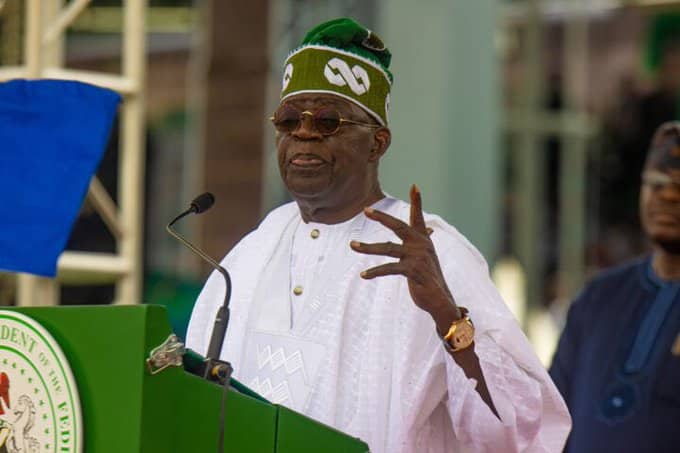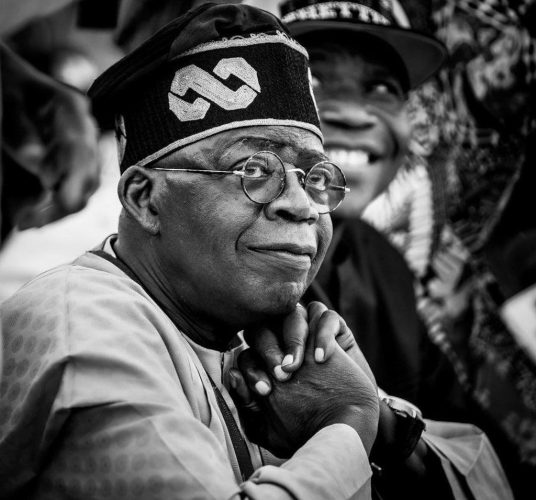You may have seen the hashtag Subsidy Is Gone trending online, and you cannot help but wonder why.
You see, Nigerians are celebrating with their president, Bola Tinubu as he clocks one year in office.
How time flies.

Some months ago, Tinubu was just an aspirant of the All Progressives Congress (APC) contesting for the seat of power.
Events of that election are still fresh in the minds of many, it was indeed the clash of the titans.
At the end of the day, the Jagaban of Lagos trashed all his opponent and clinched the mantle of leadership.
Tinubu’s One Year In Office
Fast forward to Wednesday, May 29, 2024, the day President Tinubu completed exactly 365 days in office.
This one year has not been an easy ride for Nigerians.
Many are sure that it is the “Fuel subsidy is gone” pronouncement by Tinubu that has put Nigeria in it current state.
Now, as President Tinubu clocks one year in office, Nigerians can not help but remember that declaration.
Subsidy Is Gone
On this day last year, the president declared that the era of subsidy on Premium Motor Spirit (PMS), better known as petrol or fuel, is gone.
Tinubu took an oath into office on May 29, 2023.
During his inaugural speech, the former Governor of Lagos State announced that his administration would remove the subsidy on petroleum products.
“Subsidy is gone”, Tinubu exclaimed during his inaugural address at Eagle Square in Abuja, shortly after he was sworn in as the 16th President of Nigeria.
According to him, the national budget did not include a subsidy provision from June 2023, and therefore, it has been removed.
Sadly, it is a year today that Tinubu made this announcement and Nigerians are yet to recover from the impact of this decision.
Impact Of Fuel Subsidy Removal
The removal of fuel subsidies in Nigeria has had a significant impact on the country and its citizens.
Nigerians have continued to groan over its effects with more ‘unfavourable’ policies implemented by the incumbent administration led by Tinubu.
Below are 10 effects of fuel subsidy removal on Nigerians:
Increased cost of living
The removal of fuel subsidies led to an increase in the cost of fuel, which has a ripple effect on the prices of goods and services, leading to a higher cost of living for Nigerians.
Higher transportation costs
With the increase in fuel prices, transportation costs have also risen, affecting commuters and businesses that rely on fuel for their operations.
Inflation
The removal of fuel subsidies has contributed to inflation in Nigeria, as the prices of goods and services have increased significantly.
Hardship for low-income households
The removal of fuel subsidies has disproportionately affected low-income households, who struggle to afford basic necessities due to the increased cost of living.
Increased electricity tariffs
The removal of fuel subsidies has also led to an increase in electricity tariffs, as the government seeks to reduce its spending on subsidies.
Economic Hardship
The removal of fuel subsidies has led to economic hardship for many Nigerians, as the increased cost of living has reduced their purchasing power.
Unemployment
The removal of fuel subsidies has also led to job losses, as businesses struggle to cope with the increased cost of operations.
Increased poverty
The removal of fuel subsidies has pushed more Nigerians into poverty, as they struggle to afford basic necessities.
Social unrest
The removal of fuel subsidies has led to social unrest, with protests and demonstrations against the government’s decision.
Economic growth
However, the removal of fuel subsidies is expected to lead to long-term economic growth.
Also Read: May 29: Social Media Reacts To President Tinubu First Year In Office
This is because the government seeks to invest in other sectors and reduce its spending on subsidies.
Furthermore, the Tinubu administration has been working to mitigate the effects of the fuel subsidy and other policies through various social intervention programs and economic reforms.
Low-Key Celebration
The Federal Government had earlier said that the president intends to have a low-key celebration.
Perhaps, the president himself is not happy with the situation of things in the country.
Whatever be the case, #SubsidyIsGone is top on the trends chart as Nigerians walk down memory lane to the genesis of this crisis that has befallen the country.

